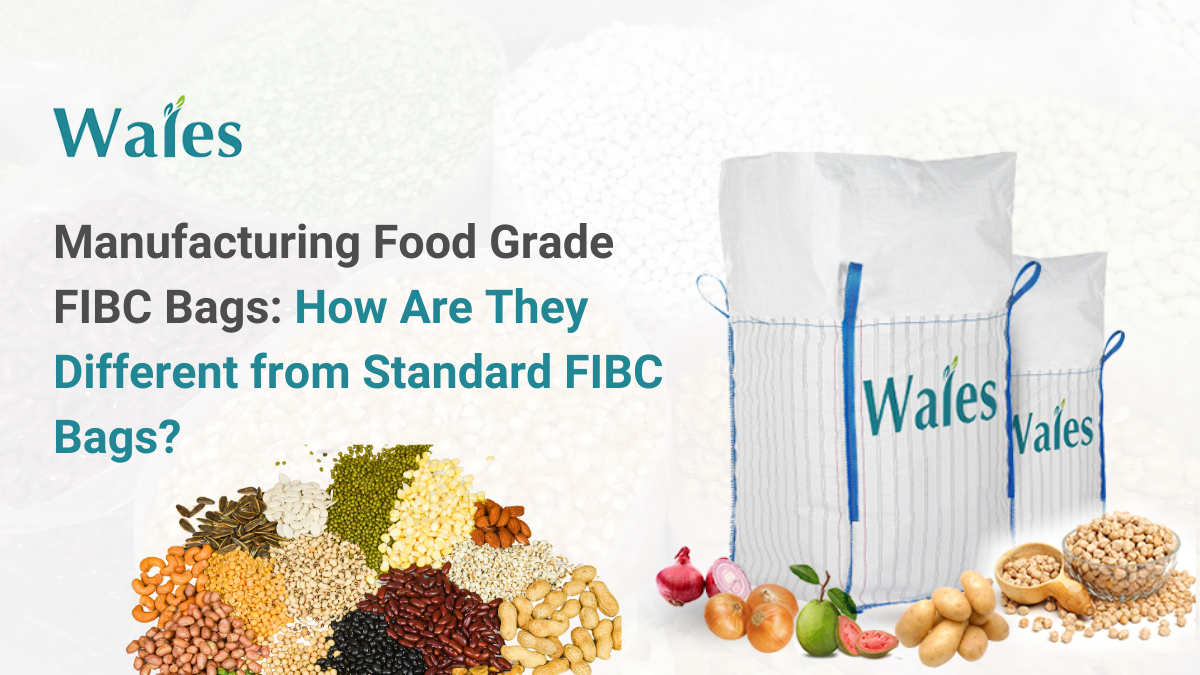Manufacturing Food Grade FIBC Bags: How Are They Different from Standard FIBC Bags?

It becomes essential to maintain hygiene, cleanliness, and a healthier environment while storing or transporting food items. Food-grade FIBC bags offer the perfect arrangement for keeping up the astuteness of consumables. These specialised packs vary altogether from standard FIBC bags in their fabricating forms, guidelines, and applications. In this article, we’ll explore step-by- step brief manufacturing process of food-grade bulk bags, including their benefits, and difference between food grade and standard FIBC bags Australia.
Manufacturing Process of Food-Grade Bulk Bags
The manufacturing of food-grade FIBC bags is conducted in profoundly controlled situations to guarantee product security and compliance with rigid cleanliness benchmarks. Key features of this process incorporate:
- Certified Facilities: Food-grade FIBC bags are delivered in offices prepared with certifications such as BRC and HACCP, guaranteeing the most noteworthy level of cleanliness.
- Controlled Environment: The generation zone is outlined to prevent contamination. This incorporates the use of positive discuss pressure, HEPA filters, and demineralised water during forms like expulsion and coating.
- Food-Safe Materials: These bags are made from virgin food-safe polypropylene, which guarantees that no unsafe materials will leak into the substance.
- End-to-End Production: To kill the hazard of contamination, the whole process—from weaving to last assembly—is carried out beneath one roof.
Benefits of Using Food Grade FIBC Bags
Food-grade FIBC bags are essential for ensuring the safety of food products throughout the supply chain. Their benefits include:
- Hygiene Assurance: Planned to preserve high cleanliness levels, these bags diminish the chance of contamination.
- Product Freshness: With highlights like air-tight seals, these bags protect the freshness and quality of perishable products.
- Compliance: Adhering to strict standards for food-safe FIBC containers, these bags meet Australian regulatory requirements.
- Durability: These bags are vigorous and capable of handling heavy loads without compromising security.
- Eco-Friendly Options: Numerous suppliers presently offer recyclable and biodegradable food-grade FIBC bags.
How to Choose the Right FIBC Bag for Food Products
Selecting the suitable FIBC bag is vital for guaranteeing the security and quality of food items. Checkout the considerations for choosing the right FIBC bag for food products:
- Intended Use: Decide the type of food product—dry, wet, or powdered—and select a bag with appropriate features.
- Material Certification: Guarantee the bag is made from food grade virgin polypropylene.
- Manufacturing Standards: Look for bags produced in certified facilities to guarantee safety.
- Supplier Reputation: Partner with trusted food grade FIBC bag suppliers for reliable products.
Learn more about How to Choose Top FIBC Bulk Bag Supplier In Australia: Ensure Quality And Reliability.
At Wales Industries, we specialise in high-quality, food grade FIBC bags custom-made to meet the one of a kind needs of the Australian market. Contact us today to investigate our customised food grade FIBC manufacturing processes for best packaging offering the safest and most dependable arrangements.
FAQs
Q: What are the key features of food-grade FIBC bags?
A: Virgin polypropylene is utilized to form food-grade FIBC bags, guaranteeing that there’s no contamination. With BRC certifications, they are made beneath controlled conditions to fulfill the most elevated guidelines for food-safe FIBC storage and transit.
Q: How do food-grade FIBC bags maintain product freshness?
A: The quality and freshness of the fabric are protected amid capacity and transit thanks to the features of food-grade FIBC bags, which incorporates airtight closures and contamination-protective liners that avoid introduction to air and moisture.
Q: What is the weight capacity of food-grade FIBC bags?
A: Based on their specs and development, food-grade FIBC bags can support loads between 500 and 2,000 kg.
Q: What makes food-grade FIBC bags safer than standard FIBC bags?
A: Standards for food safe FIBC containers/bags during the manufacturing differ from manufacturing of standard FIBC bags. Standard FIBC bags can be manufactured under normal facilities while food grade FIBC bags are manufactured under contamination-free conditions and complying with BRC guidelines.
Q: What are the differences between food grade and standard FIBC bags?
A: Food-grade FIBC bags utilize virgin polypropylene and are delivered in certified facilities, though standard bags may consolidate reused materials and need strict compliance with food security benchmarks.
Q: Why is it important to use food-grade bulk bags for consumables?
A: Food-grade bulk bags guarantee cleanliness and security by avoiding contamination. Their compliance with food security regulations is pivotal for keeping up item quality and securing consumer health.

